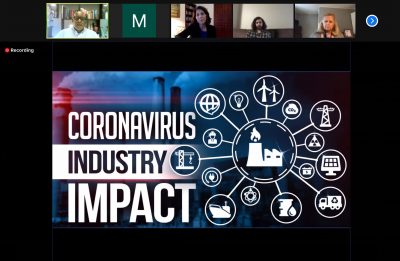Many movies this year that were supposed to break records and earn millions at the box office have had to be reimagined.

Disney’s “Mulan” was released through streaming, while other high-budget films such as the newest James Bond installment, “No Time To Die,” were postponed. Consumers can’t go to the theater right now, and ramifications from the pandemic aren’t going anywhere.
Boston University alumnus Mark Walton delivered a presentation on Friday for film and television students in the College of Communication entitled “Video Content Distribution in the Current Covid-19 Environment.” Walton, who earned his journalism degree in 1976, has since worked in the business side of the entertainment industry.
During the presentation, Walton said his work in marketing and sales, partnered with his immersion in the broadcasting world, offers him a unique perspective in the field.
“I really do want to make sure that I stress that I’m not the creative person,” Walton said. “I think that my own bias is that anyone who’s in the industry really does need to know some of the business tools.”
These tools include adapting to the current moment — the COVID-19 pandemic is changing the way films are produced and released. These distinct differences prompted professionals to speak about real industry problems, BU professor and event host Debbie Danielpour wrote in an email.
Danielpour, who teaches courses in screenwriting and film adaptation, wrote that she recently created a course in response to changes in the industry.
“Knowing that more people are watching films and television than ever, because of COVID, streaming services have increased the type and quantity of their offerings,” Danielpour wrote. “There is now demand, for example, for more limited series so I’ve added one class that discusses adapting a novel to a limited series vs a multi-season show.”
COM graduate student Andrew Smith said the entertainment industry is a business, and every student should understand it and know how to work with it. Smith, who studies screenwriting and has a background in acting and has made some of his own films, attended Friday’s presentation to gain a well-rounded perspective of the entertainment business for his future work.
“Certainly every student should understand where trends are going,” Smith said. “It’s great to be able to write something that’s truly personal or has really deep meaning, but at the end of the day, if you want it made, it’s got to be audience-pleasing and it’s got to be marketable.”
While these standards are important both now and when theaters reopen, Walton spoke about some major changes that have resulted from the pandemic, including Netflix’s subscription rates. As of March, the international Netflix subscription count grew by 31 percent since the previous year, Walton said, while U.S. numbers grew by 3.8 percent.
“[Netflix is] looking for content to feed that beast of international subscribers [who] should really be getting busy trying to create content that could fit right into the platform,” Walton said. “As we know, after you’ve watched one, you’ve got to be there with something that will bring you in to watch another.”
This transition to digital premieres and streaming, Smith said, allows content itself to change in response. He said he has seen a movement away from studios on the West Coast and a migration toward online collaboration.
“[The pandemic] does permit the content creation, certainly, out of Hollywood, but also even some of the decision making because now everything is over Zoom,” Smith said. “It’s not just where we’re selling content, but also where it’s being consumed, and how everything is moving within the home.”
Smith said his major takeaway from the presentation was how to market himself as a screenwriter.
“Students need to understand the business side of things,” Smith said, “in order to be able to put out and create the content that they want.”















































































































